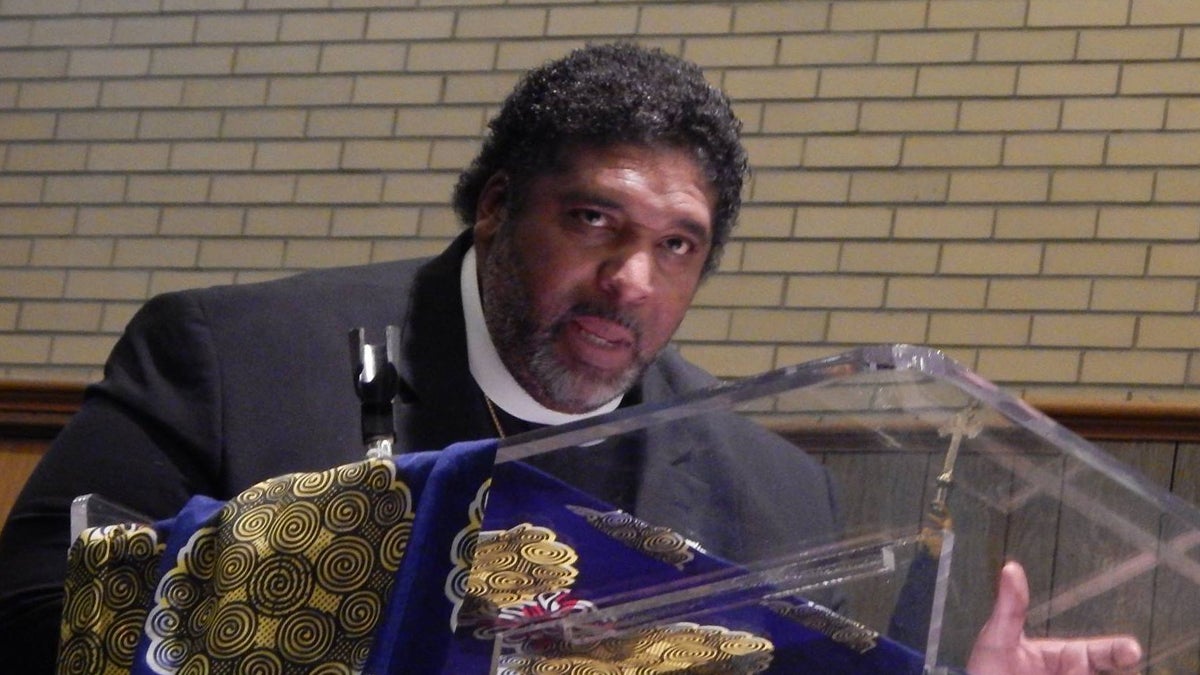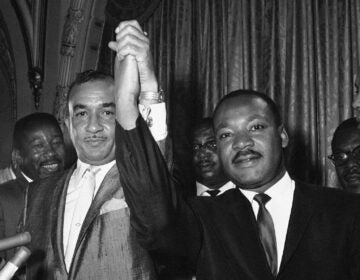At historic Trenton church, Rev. Barber calls out for moral movement in New Jersey

Rev. William J. Barber II speaks at Shiloh Baptist Church in Trenton, Thurs., March 9, 2017 (Antoinette MilesDigital Media AssociateCommunications Workers of America (AFL-CIO), District 1)
From a packed sanctuary at the historic Shiloh Baptist Church in Trenton on Thursday, a deep voice boomed out into the street.
In front of a congregation that calls itself the “Church of the Open Door,” the Rev. William J. Barber II called for a social justice movement grounded in moral resistance.
“We need a movement that won’t bow down to arrogance,” he said. “Not a left or right movement, but a truth-telling movement. Because, in truth, some things aren’t about Democrats or Republicans. It’s about what’s right, and what’s wrong.”
Barber, who also was a featured speaker at last year’s Democratic National Convention in Philadelphia, is the pastor at the Greenleaf Christian Church in Goldsboro, North Carolina.
In 2013, his preaching began reaching a wider room — a national stage —when he launched Moral Mondays, a series of protests outside the statehouse in Raleigh. Last month, about 80,000 people rallied for a “Moral March on Raleigh.”
Barber’s leadership brought a coalition of activists together; the group’s website lists 200 members. The Forward Together movement has agreed to push for a wide range of issues, reflecting the diversity of the groups in the coalition.
“Y’all with me?” Barber called out to the crowd in Trenton.
The congregation enthusiastically responded in the affirmative.
Barber, the president of North Carolina’s NAACP chapter, spoke for the need to push for action on several issues: voting rights; labor rights; access to public education; and universal health care.
“New Jersey, where 20 percent of African-Americans, one out of five, lives below the poverty line,” he said. “Now understand, don’t make the mistake and think that, above the poverty line, you aren’t poor. You’re just not poor according to the government.”
He urged his listeners to gather around what he called not only a policy agenda, but also a moral position: pro-labor; anti-poverty; anti-racism, and anti-bigotry.
Barber, who described his heritage as “black, Tuscarora Indian and white,” urged acceptance for all as he railed against discrimination of Muslims, women, and LGBT people.
“Folks that claim they’re Christians now want to do away with health care. If Jesus did anything [today], he’d set up free health clinics. Without a premium,” he added, building into a fervor. “Ask that blind man. He didn’t ask them if you’re gay. He said, ‘Thou be healed.’ He didn’t ask them if you’re poor. He said, ‘Thou be healed.'”
Time for ‘standing up’
From the podium, Barber traced the history of the “Southern Strategy,” a political tactic deployed by conservatives to polarize the country along racial lines.
He called out President Donald Trump adviser Steve Bannon by name, and he warned that the “alt right” has studied the tactic, and extremist hate is taking root once again.
“The secret to the American politics is knowing who hates who. And to engage in the politics of otherism. It’s blaming the Latino other. Blaming the black other. Blaming other people for their problems,” he said.
Hatred against certain groups is a focus on a “private sin,” he argued, which is a way to ignore the “public sin” of social inequality and limited access to public services.
He added that New Jersey is ranked as 42nd for state income inequality.
“There’s a big gap,” he said. “And women make only 84 cents on the dollar that men make.”
“But women probably pay 90 percent of the tithes,” he said, with laughter from the audience.
Barber shared the stage with faith leaders, and he called for a coalition of causes, from LGBTQ rights to union workers.
The way forward, he said, is through steady activism, week after week. State by state.
“Movements don’t come from D.C. down. They come from Trenton up. They come fromNew Jersey up,” Barber shouted over the cheering crowd.
“You’ve got some stuff y’all need to win in New Jersey? Try standing up. Not just meeting. Not just sending emails. And texts. But decide, standing up.”
Standing up, eh said, means fair and equal opportunities for all.
The event was co-hosted by the New Jersey branch of the Communications Workers of America.
WHYY is your source for fact-based, in-depth journalism and information. As a nonprofit organization, we rely on financial support from readers like you. Please give today.





